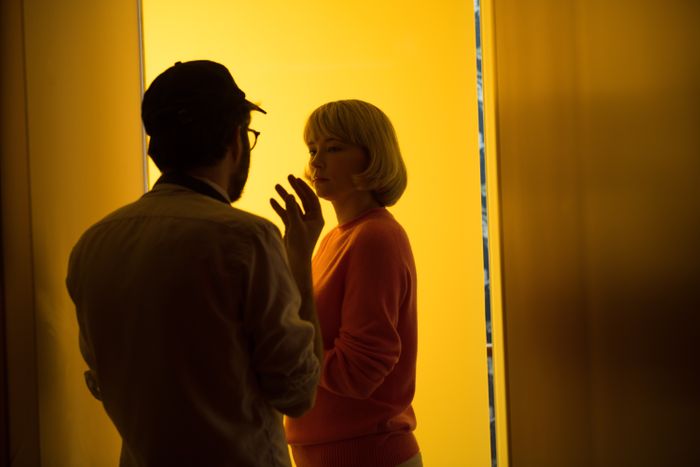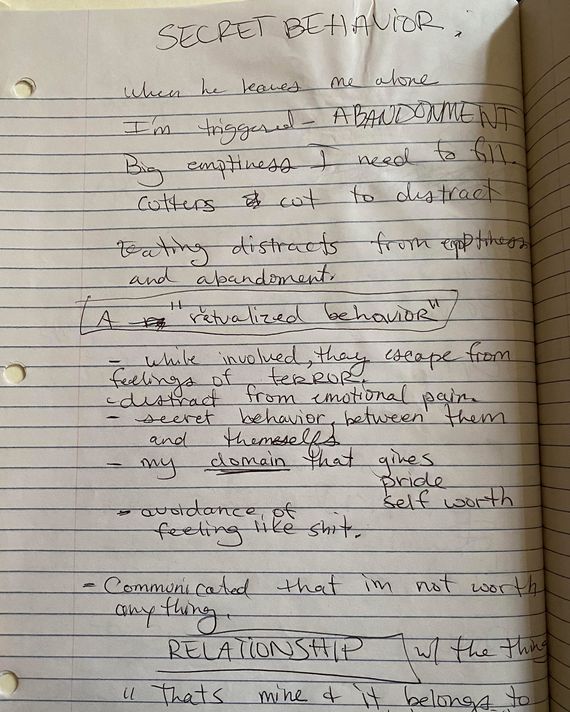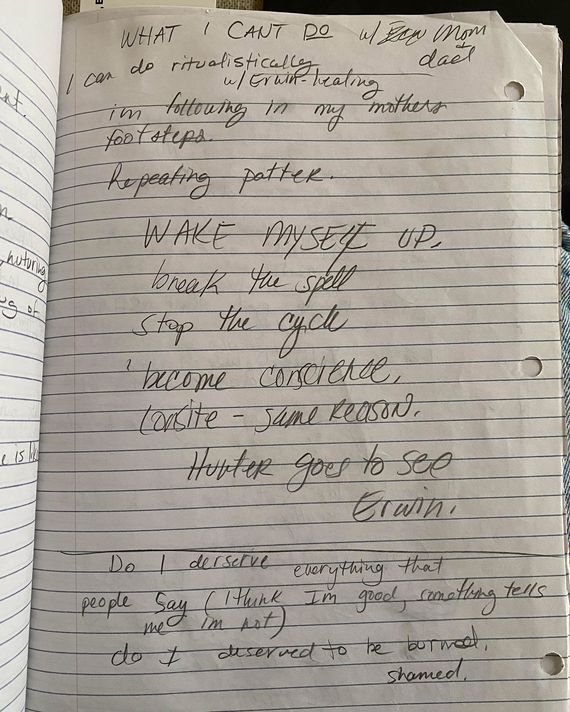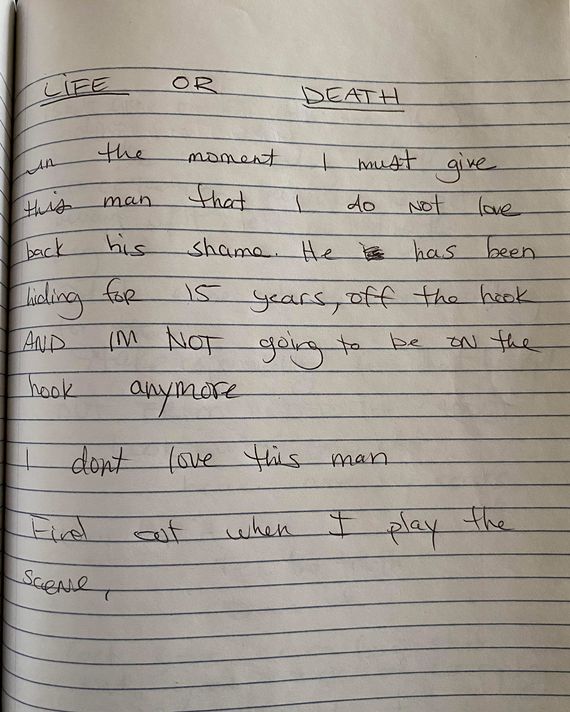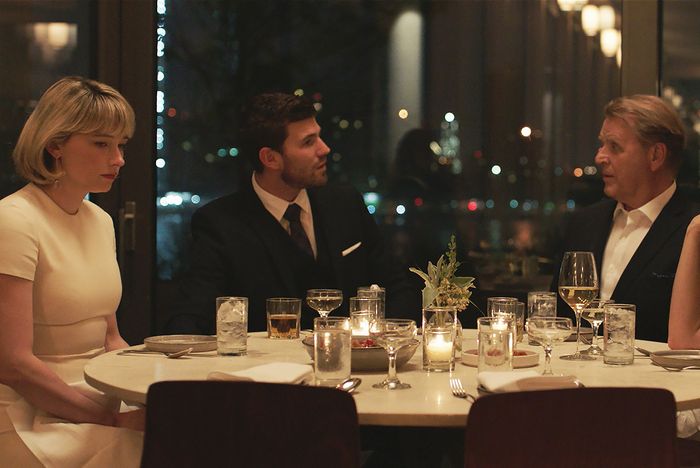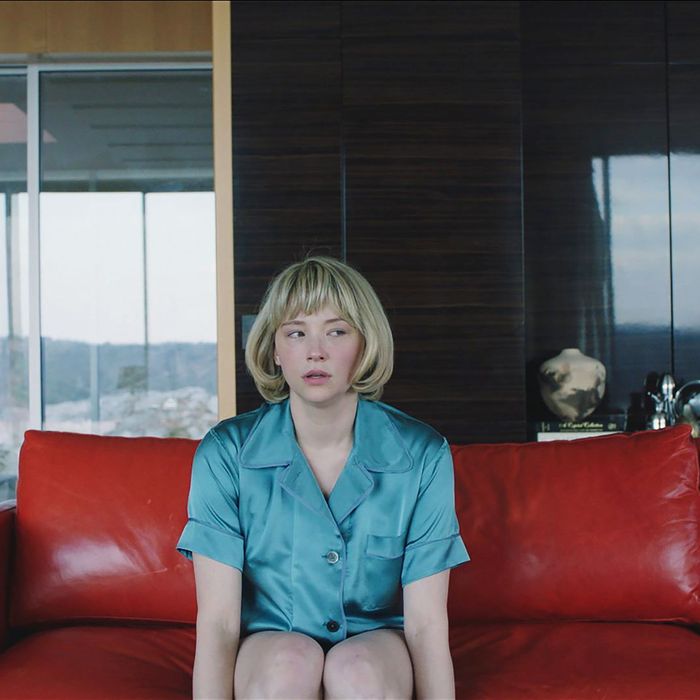
When we meet Haley Bennett’s Hunter in the new movie Swallow, she is smoothing her character’s precise, flaxen bob on the balcony of an expensive-looking mid-mod home. Surrounded by stone tiles and a clean glass railing, Hunter is dressed in a silky robe, looking out from her high perch over an idyllic river valley. Everything appears perfect, if not eerily so. She has a rich, handsome husband, and all the material comforts she could ask for. And yet the deconstruction of her glossy, sterile life becomes the backbone of the new movie Swallow.
Written and directed by Carlo Mirabella-Davis and inspired by his own grandmother, a housewife in the 1950s, Swallow tells the story of a beautiful young woman who married her way into a gilded cage. Amid a routine of keeping house, playing Candy Crush in isolation, and having dinner on the table by the time her husband finally comes home, Hunter’s personality has disappeared, her own wants and desires becoming a hazy memory as she silently labors to fit into the confines of Everything She Ever Wanted. That is, until a pregnancy test comes back positive and she can bear it no longer. Her campaign of private protest begins subtly, at a restaurant with her unloving in-laws.
In a performance that plays out like a self-contained explosion, Bennett says the restaurant scene was her greatest challenge. “It’s a simple scene, but there are so many beats and it tells so much about the dynamic between Hunter and her husband and her in-laws,” the actress explained over the phone earlier this month. “There’s so much going on beneath the surface. It was quite intimidating, but also a joy.” Since Swallow rises and falls on the micro-changes in Hunter’s demeanor, Vulture asked Bennett to break down the scene, moment by moment, and the actress — who kept a detailed diary on set at all times — happily obliged.
The Setup
Much like Mirabella-Davis’s own grandmother did to grab a small measure of control in her life decades ago, washing her hands relentlessly and burning through dozens of bars of soap each week, Hunter in Swallow develops a compulsion. She eats things. Hard things and sharp things. Marbles and safety pins. Whenever the internal pressure builds up too much, she quietly releases the valve by putting something dangerous in a body that is less and less her own, in a life she resents more and more. And when Hunter discovers she’s pregnant, she sets in motion a long process of reclaiming herself.
It begins with an at-home pregnancy test. Hunter’s husband Richie is joyous at the news revealed on the small stick. As he gives his parents the good word over the phone in the background of the frame, we see Hunter sitting on a red leather couch in the foreground, wearing a prim, blue silk pajama set, awash in terror. She has no opportunity to express her fears, as Bennett explains, before Richie starts “taking credit” with the customary “we’re pregnant” announcement. “She didn’t have the opportunity to share her thoughts or feelings about what is being signified, which is her being locked into this controlling family paradigm,” says the actress. “We can see Hunter place the mask on her face, reflecting the joy she senses she is required to feel — that she convinces herself that she does feel.” Richie eagerly kisses her, and that’s when we cut to the pivotal restaurant scene.
The Preparation
Bennett says she and Mirabella-Davis spoke extensively before production started about how she would approach a character who swallows everything from pushpins to batteries. Together, they mapped out the emotional path of the film, which was shot linearly, and she describes them as having a “quiet communication” while on set. Bennett was interpreting a character inspired by Mirabella-Davis’s grandma, but Mirabella-Davis needed help mining a specifically female anxiety like pica, the psychological disorder that compels Hunter to ingest evermore dangerous items.
Bennett says she broke down “every scene, every moment, every line in the film — and everybody else’s lines” in a notebook she carried around with her on set, “so I could get a better, deeper understanding of what was happening beneath the surface.” And many of the scenes are more harrowing to watch as an audience member, in terms of the things boiling below the surface eventually boiling over. But for Bennett, the restaurant scene was the most trying to act out. When Hunter arrives in the tony establishment where she’ll be dining with the in-laws post-pregnancy reveal, the actress says she framed the scene as a collision between the world Hunter inhabits now and the world from which she came — populated by a single mother who, for reasons soon to be found out, never gave Hunter the affection she needed. “She’s always craved the embrace of loving parents, so at first she’s overwhelmed by [her in-laws’] affirmations,” says the actress. “This is the world where she belongs; her misgivings were just a cursory illusion.”
But Hunter’s mask won’t hold for long.
The Scene
Part 1
When Hunter is greeted by Richie’s father Michael, he gestures immediately to her stomach and jokes “that’s the future CEO of our company right here,” immediately jerking her back to the moment on the couch when her personhood was supplanted by her usefulness as an incubator for the next generation of inherited wealth. In real life, Bennett learned she was pregnant right before starting production on Swallow, and while the news for her was a joyful occasion, she says that the experience only made her want to delve deeper into understanding her character and empathizing with her fears. “[Hunter’s] not given the permission to be a full individual. You know, she’s kind of stripped of her identity,” Bennett says.
Despite that, the character tries to be a good sport for the family. “Hunter laughs along with everyone, but this idea of her being used as a vessel lingers,” Bennett adds. “There are all of these tiny moments of shame that kind of come through. It’s like she wins and then she loses, so there’s a constant push-pull.”
Part 2
Though Hunter must project calm at all times, her interior process is a hellaciously twisty roller coaster. Immediately following the disappointing greeting, Hunter is uplifted as her in-laws begin sharing humanizing stories about Richie’s childhood: He liked to chew on that cat’s tail; it wasn’t all white gloves at the formal dining table. “She’s winning now,” says Bennett. “Maybe she can fit in. Maybe they are in fact what she’s been searching for. Richie’s eccentricities are being supported, celebrated. Maybe she doesn’t have to conform as much.”
But just as she allows herself to ease into the moment, Richie puts her on the spot, prompting her to share a story from her own childhood — one she thinks is mortifying but he thinks is funny. As she self-consciously starts to tell the story, Hunter is at first pleased to see Richie’s family paying attention to her. A feeling of tacit validation emboldens her to share more openly about her working-class beginnings. She’s suddenly confident she can charm them on her own terms, but is cut short when her father-in-law callously interrupts her to switch the subject to business. “Hunter is flooded with pain and anxiety. Was the story too personal? Too strange?” Bennett says, mapping out Hunter’s interior monologue. “She’s dismissed just as she begins to open up and Richie fails to come to her aid, and her true self is masked and uncared for.” The dismissal sends her into a private spiral.
Part 3
The camera fixes in on Hunter with the movie’s tightest close-up yet, so the viewer can read every twitch of hopelessness on her face. Her bob is still pristine and her pink lips the color of candy, but after one more attempt in what has surely been a yearslong struggle to be seen as equal by her benefactors, Hunter now seems certain she’s merely the delivery vehicle for a wealthy scion. “All her fears about the baby and if she belongs in this invisible prison come rushing back,” Bennett says. “You see in her eyes the look of private terror that no one notices and she’s lost in nothingness.”
Feeling utterly alone, Hunter casts her eyes down and notices a water glass on the table. The dialogue around her fades into the background as she stares at the ice floating before her. The music changes, her expression softens to relief, and we hear the faint clinking of the cubes. “She is left alone to suffer this dread and marginalization in silence, and she drifts until she notices the ice in this little hidden world, a crystal fortress of otherworldly beauty,” as Bennett puts it. “It calls to her, ‘You’ll be safe and celebrated in here, far away from all this.’”
Part 4
As her father-in-law continues to condescend to Richie about business matters, Hunter reaches into the glass with her bare hand and fishes out a cube, scoops it into her mouth, and starts crunching down, loudly. She’s chewing with an open mouth and looking everywhere around her but at her fellow dinner guests. “She doesn’t bother to do it quietly. Her first rebellion,” Bennett says of Hunter’s triumph. “She’s awkward about it, but also proud. She stood up to them a little and didn’t care about what they thought of it. It’s a pebble that starts an avalanche.” Once the family finally notices her break in decorum, they stare blankly. She gives a slight smirk before saying, “Sorry. This ice is totally awesome.”
It’s a word Hunter uses often, a sort of desperate but perfunctory expression of gratitude, an attempt to convince herself she means it above everyone else. But here, she seems genuinely grateful, not to her pretentious in-laws, but to the frozen shards melting down her throat. “Hunter was wearing many masks and hiding behind a presentation of what she should be, what a wife should be, and what a woman should want,” Bennett says. “She’s so stifled and suffocated behind the character that she unconsciously created for herself — to be the perfect host, the perfect wife, the perfect homemaker. She’s lost all sense of herself to sustain her place in this family.” But the ice is the first step in her small, ritualized process of rebellion. The thrill and agony of Swallow is watching where that step leads.



